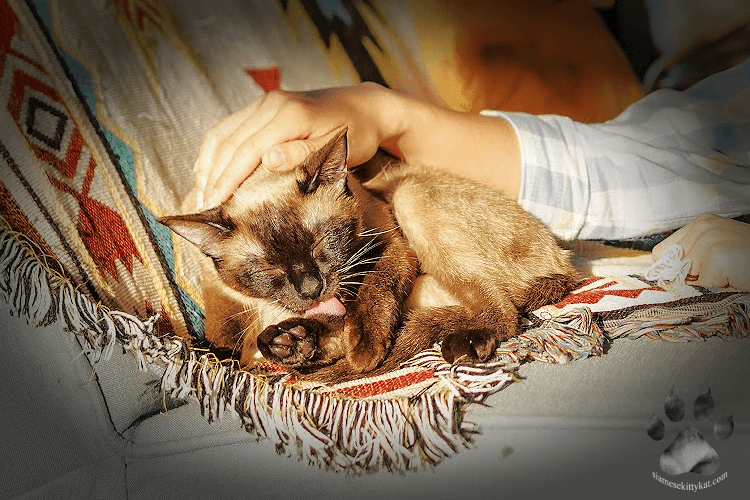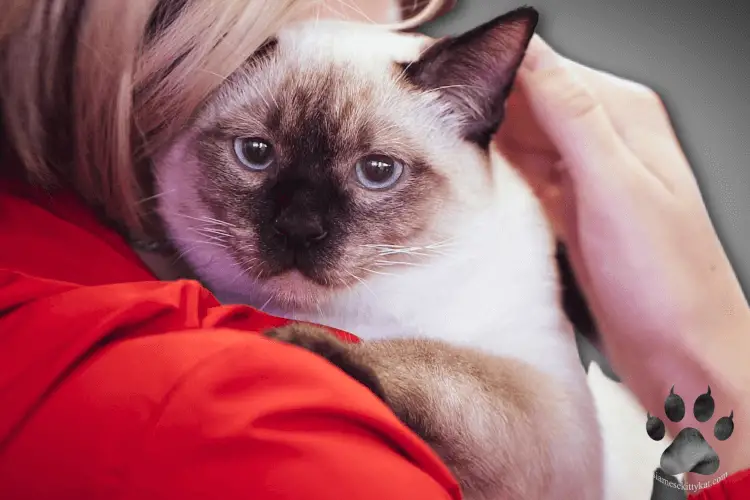Cats and humans have a special bond that goes back centuries. Cats are known for their mysterious abilities, one of which is the ability to tell if someone is sick. Cats can detect illness in people, just as humans can sense when another person is feeling unwell.
But how do cats learn this? This article will uncover the science behind a cat’s ability to detect illness. It will provide insight into why cats might instinctively know when we’re not feeling well.
How Can Siamese Cats Tell When You’re Sick?
1. Cats use their sense of smell
The amazing sense of smell that cats have is one of the most fascinating aspects of their biology. Their olfactory system is 14 times more powerful than ours. Cats can take in far more information through smell than humans ever could. They can even pick up scents too subtle for us to notice.
Cats use their keen sense of smell for many purposes. They use it to mark territories or recognize family members. Research suggests that cats also use their superior sniffing skills to recognize when someone isn’t feeling well.
2. Cats sense emotions
Cats sense certain emotional states besides olfactory cues, such as anxiety or depression. Cats have evolved with humans over thousands of years. They provide companionship during times when people are feeling under the weather. They learn to recognize human facial expressions and body language through this relationship. This is why cats gravitate toward those who aren’t feeling well.
Your cat may become protective and affectionate if you look pale, tired, or listless. Cats may also be more vocal around sick people. They meow or purr louder to show concern for their owner’s health. Some cats will even look after their owners by bringing items from around the house. These include toys or blankets to cheer them up.
3. Cats read body language

Cats can tell if you’re sick, and they show this by picking up on subtle changes in your behavior.
There are some apparent behavioral changes a sick person has that a cat can pick up on. For example, you might be more lethargic than usual or not get up around your normal time. This can send a message to your cat that something’s wrong.
Other signs that cats notice include changes in eating habits (such as not eating enough or skipping meals) or how you interact with them. A cat may notice if you’re too tired to give them the same attention or not play with them as often. All these little things add up to giving your cat clues about your health.
4. Cats recognize physical symptoms
Humans experience physical symptoms such as a rapid heart rate, high temperature, or weight loss when they are ill. These things can be difficult to spot from afar. However, they can be easily picked up by a pet who spends significant time with them.
Cats are experts at noticing even the slightest changes in their environment. They have an incredible capacity to pick up on small details we overlook. They will take note of your heart rate, skin temperature, breathing patterns, and more.
What Illnesses Can Cats Sense?
High blood pressure. High blood pressure is one of the most common ailments that cats can sense. Studies have shown that cats are attracted to people with high blood pressure. This is due to the increased body temperature associated with this condition. It gives off a distinct scent that cats can pick up on.
Cancer. Cats detect cancer in humans by smelling chemical signals. This helps owners catch the disease early on.
Seizure. Cats sense when their owner is about to have a seizure or another type of neurological issue. A cat will meow, lick, or paw at its owner’s face and attempt to wake him up if he is unconscious during an event.
Diabetes. Diabetes is one of the main illnesses cats can detect. Diabetics’ blood sugar levels fluctuate throughout the day. This causes a particular scent in their sweat that a cat can pick up on.
A cat senses a change in your body and may start nudging you or meowing until you wake up and take action.
Do Cats Take Care of Sick People?

Cats are helpful when caring for sick people, especially those with special needs such as autism and dementia. They can provide comfort and stress relief. This helps improve the quality of life for individuals who may otherwise struggle to find joy.
Therapy cats are often brought into nursing homes and other facilities. They can help those battling illnesses such as Alzheimer’s disease and dementia.
Cats are also proving beneficial in aiding autistic children. Autism can sometimes cause children to feel overwhelmed by sensory stimuli, leading to tantrums or aggression episodes. However, having a therapy cat prevents these outbursts by providing a calming influence in stressful environments.
These types of interactions must be supervised by professionals. Cats brought into such an environment must be up-to-date on vaccinations and free from diseases.
Why Does My Cat Lay on Me When I’m Sick?
One of the main reasons cats love laying on top of us when we’re sick is due to our body heat. Cats love warmth, so they are drawn to the heat when someone is sick. This also explains why cats often seek out warm paper or cardboard boxes.
Cats also think they’re helping us get better by keeping us company while we’re sick. It is thought that cats recognize a sign of vulnerability when humans are sick. They respond by providing some extra comfort and companionship.
My Siamese cat, Batman, loves to sleep on me when I have a fever. My body temperature is elevated, and he enjoys the extra heat. He’ll curl up next to me and take a long nap. I actually appreciate his company. He makes me feel better physically and emotionally, and I know he’s trying to help out however he can.
Cats may seem capable of detecting when something isn’t quite right with their human friends. They do this through keen observation of our behavior and their powerful senses of smell.
Further research needs to be done to discover exactly how cats can detect sickness in people. However, it’s safe to say that our furry friends possess an innate ability that provides us with comfort during difficult times.
We gathered all the health tips tailored toward maintaining your Siamese cat’s optimal well-being. Check it out here: Siamese Cat Health: A Complete Guide
